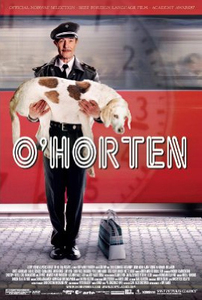
Movies
Reviews

Review: O'Horten
Filed under: Reviews
In the realm of world cinema, Norwegian film remains largely unknown -- perhaps eclipsed by their Scandinavian neighbors, Sweden and Denmark. While Norway has a long cinematic tradition, dating back to the first decade of the twentieth century, only seven to eight features are produced annually and most productions remain unavailable to English-speaking audiences. And so it was a rare treat to attend a screening of the Norwegian film, O'Horten, a quietly moving dramatic comedy.
The film follows the aptly name Odd (played by veteran actor Baard Owe), a sixty-seven year old loner who has found comfort his entire life in a risk-free existence structured by routine. Faced with retirement from his job as a train engineer, he is like a caged parrot released into the wild -- suddenly he possesses a freedom he has no idea what to do with. Odd is forced to examine the choices that have led to his social isolation and detachment from anything that might be described as "vital." Through a series of increasingly absurd misadventures, such as sneaking into a public pool in the middle of the night to skinny dip and allowing a blindfolded man to drive him through the streets of Oslo, he finds a new way to live.
Owe plays the lead character with a pointed lack of expression--his mouth set in a perpetual straight line, neither curling up into a smile or down into a frown. However, his eyes are always alive, sparking with the feelings he attempts to suppress. This subtle touch transforms Odd into a character of immense emotional complexity.
The most stunning aspect of this film is its visual imagery, which serves to mirror Odd's internal landscape. The film opens with Odd driving his train into a tunnel, a perfect representation of his myopic worldview. In a nice bookend effect, one of the final shots is of him emerging from a tunnel, only this time as a passenger. In this ways, the audience immediately understands that he has relinquished himself of his need for complete control and is open to change. There is another incredible scene, also rich with symbolic imagery, set on the evening of Odd's retirement ceremony. Odd and several of his associates are invited to a co-worker's apartment for drinks, but he misses his chance to go in with the group when he goes buy pipe tobacco instead. Upon his return he attempts to buzz in but the intercom falls off the wall. Surrounding the building's façade is scaffolding encased in plastic sheeting. Odd looks up several stories to his co-worker's lit apartment which seen through the plastic sheeting look like headlights in a fog -- a beacon extending to remind one he/she is not alone. But Odd really is alone -- he attempts to climb the scaffolding to reach the apartment but never makes it to the party. The lit apartment seems to represent the warmth, happiness and camaraderie that Odd glimpses but is ever excluded from.
Despite the film's pervading melancholy, it manages to be surprisingly funny and even contains a few laugh-out-loud moments. Of course the film does not progress at the breakneck pace of your typical Hollywood summer comedy, but those who take the time to see this film will be rewarded with a humorous, meaningful and insightful treat.
Tags: Baard Owe, Norway, Bent Hamer, foreign films, scandanavian film






Comments Posted (